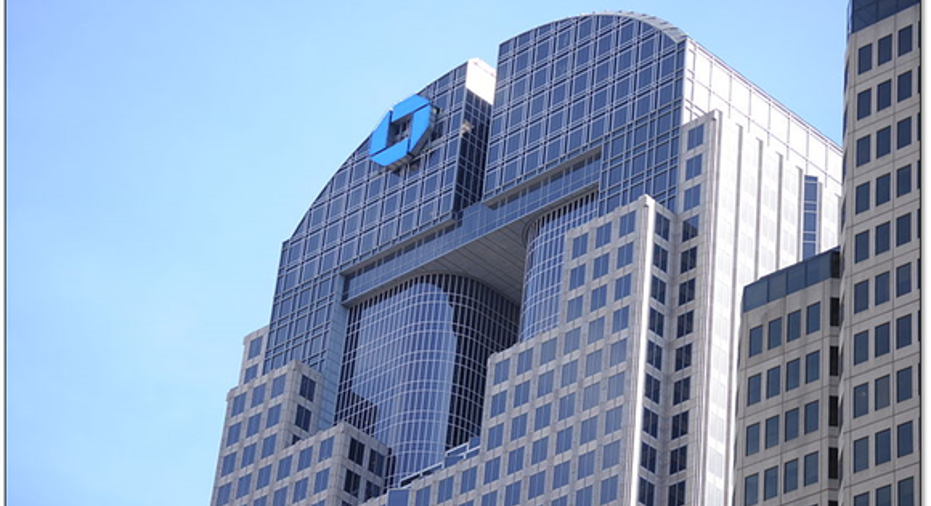Why Shares of Bank of America and Citigroup Soared on Wednesday

JPMorgan Chase's better-than-expected first-quarter performance sent bank stocks higher on Wednesday. Image source: Wikimedia Commons.
Shares of Bank of America and Citigroup are up sharply on Wednesday after JPMorgan Chase released first-quarter results that beat analyst expectations but were nevertheless lower compared to the same period last year.
For the three months ended March 31, JPMorgan Chase earned $5.52 billion, or $1.35 per share. That was 6.7% below the year-ago period, but it exceeded analysts' forecasts, which called for a profit of $1.26 per share.
The first quarter was a difficult one for the bank industry. Worries about China and Europe spurred excess volatility in equity and fixed-income markets that translated into lower trading revenues for the nation's biggest banks.
Citigroup had previously said that its trading revenues were trending lower by 15%. JPMorgan Chase followed that up with a prediction in the middle of the quarter that its trading unit could be down by as much as 20% compared to the same period last year. Given that Bank of America operates a trading division, it too was/is expected to take a hit from institutional investors' decision to sit on the sidelines.
Image source: iStock/Thinkstock.
JPMorgan Chase's results, released this morning, confirmed that trading revenues were indeed lower, though not by as big of a margin as it and Citigroup had previously intimated. They dropped 11% in the first three months of the year, falling from $5.81 billion in the year-ago period down to $5.17 billion so far in 2016.
On top of this, investment banking revenue was down at JPMorgan Chase, falling by 26% relative to the first quarter of 2015. This trend is expected to impact Citigroup and Bank of America as well given their sizable Wall Street operations.
Lower oil and gas prices have also been at the forefront of banks' minds, as energy companies have started to struggle to service their debts. To this end, just this morning, Peabody Energy filed for Chapter 11 bankruptcy protection. Citigroup leads the way with the most exposure to energy loans, followed by Bank of America, JPMorgan Chase, and Wells Fargo, respectively.
Data source: JPMorgan Chase, Bank of America, Wells Fargo, and Citigroup.
JPMorgan Chase's results showed that the concerns are warranted. It set aside $1.82 billion in the first quarter in anticipation of future defaults. That was nearly twice what it provisioned for in the first quarter of 2015.
The most positive news from JPMorgan Chase's performance came from its consumer bank, where profits increased on a year-over-year basis. Following on the heels of the Federal Reserve's decision in December to hike the Federal Funds rate by a quarter of a percentage point, JPMorgan Chase's interest on earning assets increased from 2.60% in the fourth quarter of last year to 2.72% in the first three months of this year.
That's particularly positive for Bank of America, given the size of its retail operations. It will also be welcome news to Citigroup, which, like all other banks, have seen their lending margins squeezed since the central bank dropped interest rates to near zero in the aftermath of the financial crisis.
Image source: iStock/Thinkstock.
All told, there's no getting around the fact that banks struggled in the first quarter. JPMorgan Chase's results prove this out. Adding insult in injury was the news, released today, that it, along with Bank of America and three other major banks, must resubmit their living wills to federal regulators. Citigroup fared better, though it too came up short according to regulators.
The saving grace for investors in all of this is that analysts and commentators were expecting an even graver performance from the nation's biggest bank by assets to start out the year. This is the reason that shares of JPMorgan Chase, Bank of America, and Citigroup are all higher in intraday trading.
JPMorgan Chase's shares were up more than 4% in the wake of its earnings beat. Shares of Bank of America and Citigroup followed suit, up by 4% and more than 5%, respectively, roughly halfway through the trading day on Wednesday.
The article Why Shares of Bank of America and Citigroup Soared on Wednesday originally appeared on Fool.com.
John Maxfield owns shares of Bank of America and Wells Fargo. The Motley Fool owns shares of and recommends Wells Fargo. The Motley Fool has the following options: short May 2016 $52 puts on Wells Fargo. The Motley Fool recommends Bank of America. Try any of our Foolish newsletter services free for 30 days. We Fools may not all hold the same opinions, but we all believe that considering a diverse range of insights makes us better investors. The Motley Fool has a disclosure policy.
Copyright 1995 - 2016 The Motley Fool, LLC. All rights reserved. The Motley Fool has a disclosure policy.



















